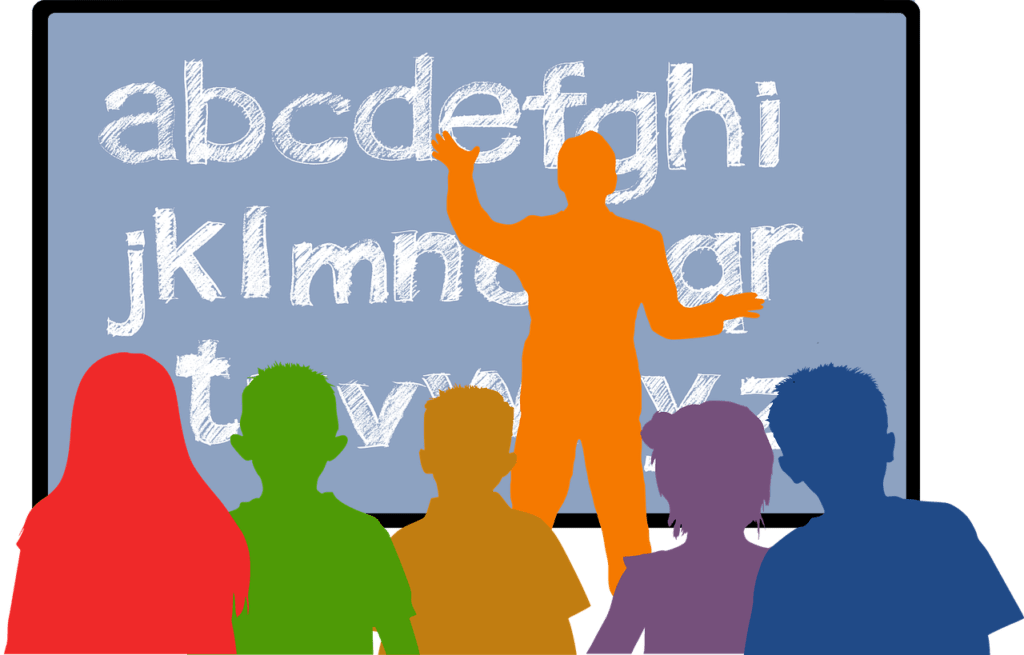Listen to Brenda tell the story
All across Germany, volunteers are working tirelessly to help Ukrainian refugees. In my town, a small group of people is teaching German to Ukrainians, from schoolchildren to grandmothers. I don’t feel especially qualified to instruct German, but I have been trained to teach English as a foreign language and did so for years. To some extent, this training applies to any language. I decide to take the plunge.
Anticipating my first 90-minute class, I’m on edge. I examine the teaching material from the local Integrationsbeauftragte, a real doozy of a compound German word that means: She who has been assigned the task of integration. (Now you can see why Germans are so efficient, armed as they are with the powerful linguistic machinery that enables them to pack so much meaning into just 23 letters.) The material includes a booklet designed especially for the Ukrainians with the basics: numbers, the alphabet and day-to-day expressions together with Ukrainian translations.
Soon my dining room table is covered with index cards, colored pens and colored paper, all things that seem like they might be useful. But after several hours of flipping through my Ukrainian booklet and shuffling the index cards back and forth, I am still clueless on how to prepare.
Inspiration strikes: visual aids! I draw a poster-sized map of Ukraine. Now I realize how limited my knowledge of Ukrainian geography is – and that they have two major rivers, the Dnieper and the Dniester. Most cities have only recently become household names from news on the war.
The evening of the first class arrives. Eight people between the ages of 30 and 70 are seated at a long table and are looking at me expectantly. I take a deep breath.
“Guten Abend!”
“Guten Abend!”, comes the scattered reply.
So far, so good.
I introduce myself, explaining that I am from “America,” betting that this word is similar in Ukrainian. They understand and nod.
One woman is from Kharkiv. Another woman, Oksana, is from just north of Kyiv. An older woman, Valentina, is from the south near the Black Sea. I will soon learn that she is looking after her two grandchildren. They write their names on post-it notes and tack them to my map. When I express surprise that a man and a woman are coincidentally from the same town, they smile and explain. They’re married. Ah yes, what a coincidence.
I introduce the alphabet. Ukrainian uses the Cyrillic alphabet, so they’ll need to learn the Roman one for visits to government authorities, doctors, and other institutions where they will have to spell their name. They struggle, spelling their names slowly, reading them off the course registration form.
“Let’s all say it together!” I announce in my best Stentorian teacher voice. I sweep my arm in a big circle to signal that everyone should read together out loud.
Seldom has my flair for drama been so useful.
“A – B – C,“ I read out loud. Blank looks. Nobody speaks.
“Together!” I repeat, circling my arm again, this time with more than a modicum of melodrama. I feel like a magician casting a spell to conjure up a language ability that isn’t there. Maybe if I just swing my arm a little faster…
“A – B – C…” Finally, they all join in.
After this first lesson, I go home and watch the news. Many of the cities where my students are from are being bombed this very minute. It feels much more tangible, more horrible, after laughing and joking with people from those places just a few paces from my doorstep.
Over time, I get the hang of teaching German. I even manage to slip in some jokes. As a foreign speaker of German myself, I have lots of funny stories. Like the one from my brother’s visit.
“Try to say this number,” I challenged him. Fünfhundertfünfundfünfzig, five-hundred fifty-five. He failed miserably, which was, of course, precisely my intention. This impossible number combines the umlaut with the curious German custom of saying numbers backwards, as in “four-and-twenty blackbirds” from the nursery rhyme or the classic first line from the Gettysburg Address, “Four score and twenty years ago.” It seems we used to say our numbers backwards, too.
My brother’s attempt to say this number provided considerable amusement to all German speakers present.
Now it works its magic on the class. Hearing me say it, they all burst out laughing.
After several lessons, I develop a routine. I repeat myself, reinforcing words with dramatic gestures and pantomiming jokes when language fails. A sense of camaraderie and group dynamic develops. It starts to feel like a bona fide language class.
But when I return from a month-long vacation, my substitute informs me that the class has completely dissolved. Three people are taking more advanced classes, one person has returned to Ukraine, another has moved to Saxony, and one is working longer hours and cannot make it to class. Nobody knows where the others are.
I had been racking my brain on how to tackle German grammar in a fun way. Now I won’t need to.
Valentina, the one looking after her grandkids, had shown me a photo of her son in combat gear who was fighting in Kharkiv. Her worry was unmistakable, even though I couldn’t understand her words. I wonder how he is doing now, and how she is dealing with it.
I mostly gave my students a bit of diversion from the reality of their situation. They have scattered in all directions now. I wasn’t able to teach them a whole lot of German, but they did learn the alphabet and the numbers – even if they never mastered “555.” I just hope they are all OK, wherever they are.
Brenda Arnold
See also:
Emotional baggage: Why I pack too much on trips home
On the (Same) Road Again
The ladies, the rest home and the bombs
